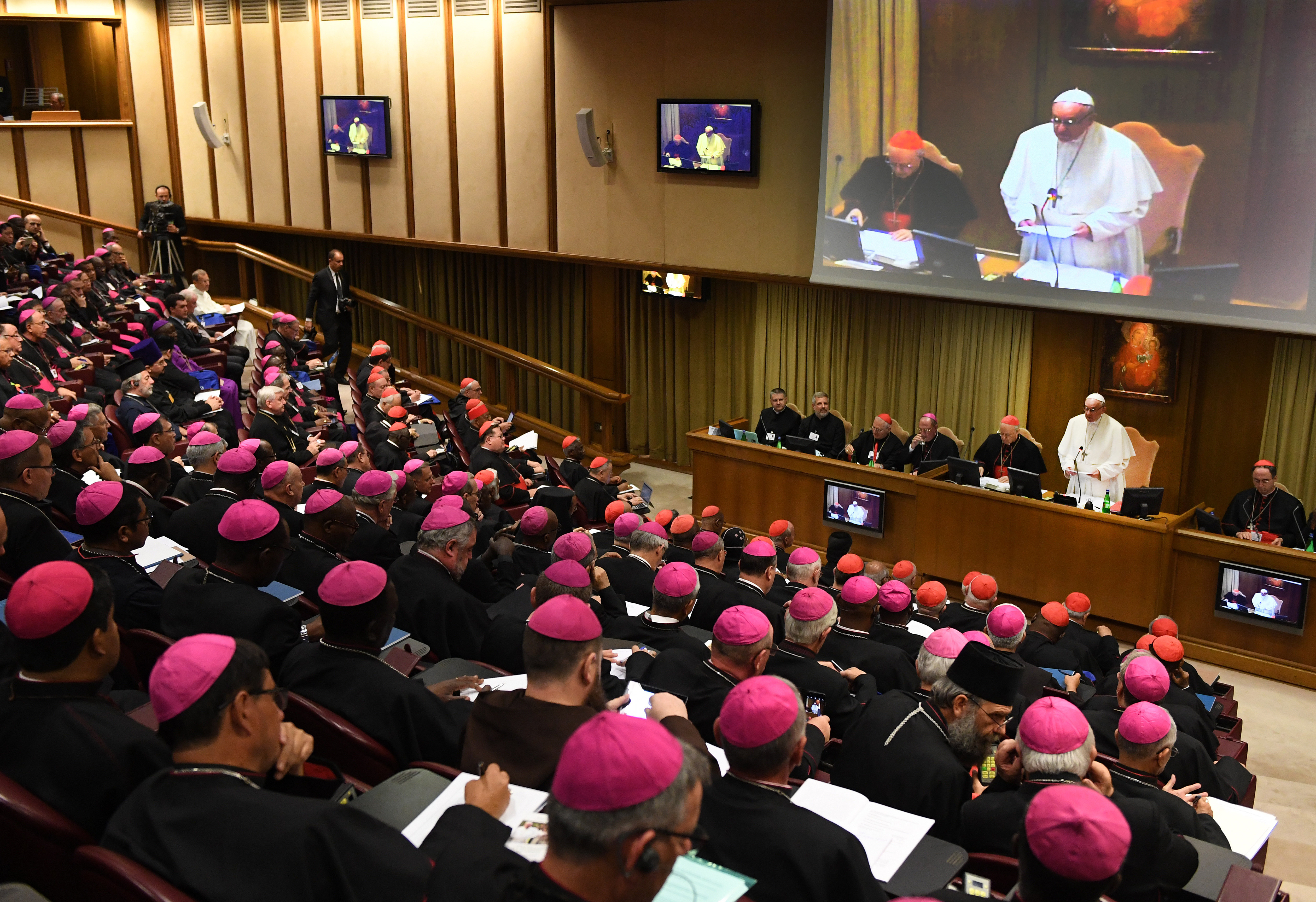11 October 2018 | by Christopher Lamb in Rome , Christa Pongratz-Lippitt , Liz Dodd
The Tablet
The 12 men who will draft final youth synod doc

Pope Francis at the XV Ordinary General Assembly of the Synod of Bishops on Young People
Photo: Vandeville Eric/ABACA/ABACA/PA
Photo: Vandeville Eric/ABACA/ABACA/PA
English group: 'This scandal has undermined
the work of the Church in practically every way...it has compromised our
credibility.'
A 12-member commission of bishops and priests representing nearly
every part of the world will draft the youth synod’s final document.Five of them were elected by the synod fathers and include Cardinal Peter Turkson, the Prefect of the Dicastery for Promoting Integral Human Development, (Africa), the Cardinal Archbishop of Mexico City, Carlos Aguiar Retes (Americas), the Archbishop of Melbourne, Peter Comensoli (Oceania), Cardinal Archbishop of Bombay, Oswald Gracias (Asia) and the Archbishop of Chieti-Vasto, Bruno Forte (Europe).
The Pope also named three personal appointees to the commission. These include the Major Archbishop of Ukraine’s Greek Catholic Church, Archbishop Sviatoslav Shevchuk, Brazilian priest Fr Alexandre Awi Mello, secretary of the Dicastery for Laity, Family and Life and Fr Eduardo Redondo, who has responsibility for pastoral vocation work for the Church in Cuba.
The job of the body will be to draft a document that will be presented to the synod fathers to discuss and vote on. The work will be led by the Cardinal Archbishop of Brasilia, Sérgio da Rocha, the relator general of the synod, Cardinal Lorenzo Baldisseri, the Synod of Bishops secretary-general, and the two synod special secretaries, Jesuit priest Fr Giacomo Costa and Salesian Fr Rossano Sala.
Their first task will be to take material from the synod’s small group discussion groups, known as the "circoli minori", which has included discussion of the abuse scandals.
“The issue of child sexual abuse in the Church cannot be skimmed over tangentially in a few short sentences,” writes English group “A”. “The shattered trust, the trauma and lifelong suffering of survivors; the catastrophic failures in case management; the continued silence and denial by some of these awful crimes and sins - these issues cry out to be named openly by the Synod.”
The English group “D” explains that “we spent a good deal of time discussing the sex abuse crisis in the Church, especially regarding its effect on the evangelisation of the young.” The report went on: “As is obvious to everyone, this scandal has undermined the work of the Church in practically every way, precisely because it has compromised our credibility.”
Other issues raised in the small groups include the importance of having a “ministry of listening,” offering support to young migrants and the impact of digital culture on the Church’s mission.
German language group’s first resumée
On 9 October, the German language group of
the so-called “circuli minori” published its resumée of the topics
discussed and debated at the Youth Synod up to now.
One of the main things the group
immediately noticed was that despite the hugely different situations
young people worldwide found themselves in, certain topics and problems
such as the challenges of sexuality, the subject of abuse, the
difficulty of imparting the faith, digitalisation, the matter of an
attractive liturgy and sermon, flight and migration and the question of
justice for women in the Church – confronted young people everywhere.
The group observed that in Pope Francis’
Pontificate two concepts continually reoccurred – namely joy and
discernment. “We realised and would like to emphasise how precious and
at the same time challenging both are for our own interaction with other
young people.”
On multiple occasions during the first part of the Instrumentum, the
German group felt that a special section should be inserted to discuss
the stress young people were in many ways exposed to nowadays – “the
stress at school, the stress caused by the Church, by our parents’
expectations, by peer groups or the stress which ensues when a young
person admits that he or she is a Catholic”.
The group would also like to point out that
there are further reasons why young people distance themselves from the
Church and the faith besides a general mistrust of institutions which
was the reason discussed at the Synod. In the German group’s opinion
there were three other main factors. First, the seeming incompatibility
between a modern, scientific worldview and the views held by the
Catholic Church; secondly, those questions that - directly or indirectly
– had to do with sexuality and gender relations, such as the assessment
of divorce and remarriage, celibacy, women’s ordination and the abuse
scandals, and thirdly the seeming or often confirmed connection between
religion on the one hand and war and violence on the other. “We also
often find that the parish is not a place for young people and see this
as a challenge to look for different or new places and forms of
community outside the parishes. Young people have the right to see
institutions critically and not infrequently their criticism is right.”

No comments:
Post a Comment